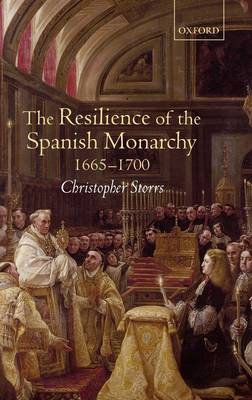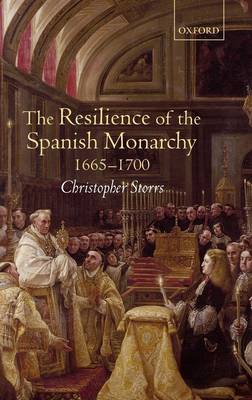
- Retrait gratuit dans votre magasin Club
- 7.000.000 titres dans notre catalogue
- Payer en toute sécurité
- Toujours un magasin près de chez vous
- Retrait gratuit dans votre magasin Club
- 7.000.0000 titres dans notre catalogue
- Payer en toute sécurité
- Toujours un magasin près de chez vous
297,95 €
+ 595 points
Description
Christopher Storrs presents a fresh new appraisal of the reasons for the survival of Spain and its European and overseas empire under the last Spanish Habsburg, Carlos II (1665-1700). Hitherto it has been largely assumed that in the "Age of Louis XIV" Spain collapsed as a military, naval and imperial power, and only retained its empire because states which had hitherto opposed Spanish hegemony came to Carlos's aid. However, this view seriously underestimates the efforts of Carlos II and his ministers to raise men to fight in Spain's various armies--above all in Flanders, Lombardy, and Catalonia--and to ensure that Spain continued to have galleons in the Atlantic and galleys in the Mediterranean. These commitments were expensive, so that the fiscal pressures on Carlos' subjects to fund the empire continued to be considerable. Not surprisingly, these demands added to the political tensions in a reign in which the succession problem already generated difficulties. They also put pressure on an administrative structure which revealed some weaknesses but which also proved its worth in time of need. The burden of empire was still largely carried in Spain by Castile (assisted by the silver of the Indies), but Spain's ability to hang onto empire was also helped by a greater integration of centre and periphery, and by the contribution of the non-Castilian territories, notably Aragon in Spain and Naples in Spanish Italy. This book radically revises our understanding of the last decades of Habsburg Spain. As Storrs demonstrates, it was a state and society more clearly committed to the retention of empire - and more successful in achieving this--than historians have hitherto acknowledged.
Spécifications
Parties prenantes
- Auteur(s) :
- Editeur:
Contenu
- Nombre de pages :
- 288
- Langue:
- Anglais
Caractéristiques
- EAN:
- 9780199246373
- Date de parution :
- 28-12-06
- Format:
- Livre relié
- Format numérique:
- Genaaid
- Dimensions :
- 163 mm x 241 mm
- Poids :
- 580 g

Les avis
Nous publions uniquement les avis qui respectent les conditions requises. Consultez nos conditions pour les avis.






